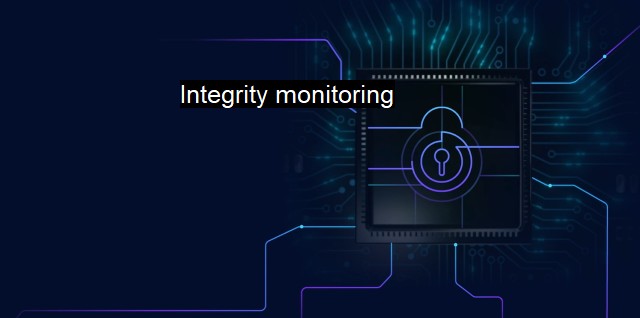What is Integrity monitoring?
Ensuring Robust Cybersecurity: The Importance and Implementation of Integrity Monitoring
Integrity monitoring refers to a critical aspect of cybersecurity that identifies any unusual or unexpected behavior within a computer system or network. it is a security mechanism designed to protect essential data and applications from malware, Trojan horses, ransomware, viruses, and other malicious cyber threats. Successful cyber integrity monitoring ensures that the keys, data, codes, and algorithms of a system retaining its characteristic form with completeness, soundness, and undivided configuration. The expected state of these system components represents the standard integrity reference. Any deviation from this reference state signals a potential threat.As one of the fundamental principles of information security, integrity monitoring is highly crucial. The principle is defined by the assurance that information can only be accessed and modified by those authorized to do so. In a perfect cybersecurity scenario, this implies that data and systems remain precisely as intended, no additions, deletions, or modifications being made without appropriate permissions and the user's knowledge. The challenge comes in maintaining this ideal state continually as cyber threats morph and evolve, thus necessitating robust integrity monitoring systems.
One way that integrity monitoring works is by continual checkups on the system's files and identifying any modifications, deletions, or additions. These checkups comprise what is known as integrity checks, which regularly compare current system states with previous configurations. Should the system detect any unauthorized or unexpected transformations, integrity check fires an alarm, hairing a signal of potential cyberspace vulnerability. Integrity checks might also trigger system responses such as blocking the user responsible or, in some cases, automatically undoing the detected verrant alterations. By swiftly catching and remedying these alterations, integrity monitoring can prevent severe data loss and system malfunctioning.
Another principle allied to integrity monitoring is file integrity checking. Software or applications perform file integrity checks that employ hash algorithms to generate what's known as hashes or checksums. The unique checksums symbolize the express files state at that particular time. These generated hashes are then compared continually to those of the same files in the event where the comparison does not match, it’s a suggestion that the file could have been altered, deleted, or there might have been an addition.
A core feature of antivirus software is their ability to carry out integrity monitoring. Antiviruses continually screen for disregards of the integrity principle, identifying and dealing with cyber threats before they manifest into bigger problems. These antivirus integrated monitoring checks are undertaken in real-time, meaning they're ideally instantaneous - they provide instant alerts of alterations for immediate remedying.
While integrity monitoring is essentially an automated process, the human intervention aspect should not be overlooked. Protocols such as contingency planning, risk assessments, incident response, can seemingly determine the effectiveness of cybersecurity mechanisms. Therefore, integrity monitoring should be founded on a cybersecurity strategy encompassing human intelligence and machine functionalities.
Integrity monitoring has invaluable importance to the realm of cybersecurity. Organizations worldwide base their trust in computer systems to store sensitive data and business information. Integrity monitoring helps ensure that this trust is never misplaced. It provides continuous at-watch for potential threats, simultaneously deterring hackers and other cyber culprits from intruding into systems and stealing or manipulating data.
Therefore, reinforcing the importance of implementing effective integrity monitoring systems enjoys precedence in cybersecurity programs is paramount. These systems act as the organization's much-needed first line of defense in protecting their data and overall information system integrity.

Integrity monitoring FAQs
What is integrity monitoring in cybersecurity?
Integrity monitoring is a cybersecurity technique that involves tracking changes and modifications to critical files, folders, and system settings. The aim is to detect any unauthorized alterations and prevent potential security breaches.Why is integrity monitoring important for antivirus protection?
Integrity monitoring plays a crucial role in antivirus protection by helping to identify and isolate malicious activities occurring within a system or network. It provides an additional layer of defense against viruses, Trojans, and other types of malware.What are some common integrity monitoring techniques used in cybersecurity?
Some common integrity monitoring techniques used in cybersecurity include file integrity checking, registry monitoring, and network monitoring. These techniques are performed using specialized tools that continuously scan the system for any changes that may indicate security threats.What are the benefits of implementing an integrity monitoring solution?
Implementing an integrity monitoring solution can provide several benefits, such as increased visibility into system changes, faster detection of security threats, improved response time to security incidents, and greater compliance with industry regulations. It can also help organizations identify and mitigate potential vulnerabilities, reduce the risk of data loss, and improve overall cybersecurity posture.| | A | | | B | | | C | | | D | | | E | | | F | | | G | | | H | | | I | | | J | | | K | | | L | | | M | |
| | N | | | O | | | P | | | Q | | | R | | | S | | | T | | | U | | | V | | | W | | | X | | | Y | | | Z | |
| | 1 | | | 2 | | | 3 | | | 4 | | | 7 | | | 8 | | |||||||